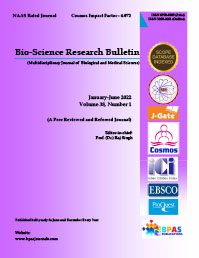Need of Training among Educators to Roll Back During COVID-19: A descriptive Survey
DOI:
https://doi.org/10.48165/Keywords:
COVID-19 wave -2, Education professionals, Knowledge, Attitude, Practice, IndiaAbstract
Because of the yearlong lockdown and closure of educational institutions, COVID-19 has impacted the school sector in a variety of ways. When educational institutions reopen after the lockdown, educational personnel might be one of the most helpful sources of Coronavirus disease (COVID-19) related health information for their young adult students. However, it is critical that they have sufficient and correct understanding about COVID-19 prevention. Before educational establishments reopen, knowledge of preventative strategies is critical to success. The goal of this research was to examine awareness among educators by evaluating their degree of knowledge, attitude, and behaviour, as well as their link with chosen socio-demographic characteristics. The participants in this research were education professionals from Rajasthan state, India, who worked in schools, colleges, and universities. A pre-tested, self-structured questionnaire on COVID-19 preventative measures and preparedness to witness a rollback was given as a Google Form. Participants and chosen socio-demographic characteristics were subjected to a detailed descriptive analysis to determine their knowledge, attitude, and practise. To determine the degree of knowledge, attitude, and practise, an item-by-item analysis was performed. At a 95% confidence interval of 12.42±0.08, the average knowledge value was determined to be 12.42±0.08. (12.40-12.070). In all 700 individuals, the average attitude score was 2.216±0.385 at 95 percent confidence interval (2.064-2.367), while the average practise score was 1.67±0.472 at 95 percent confidence interval (1.0712-1.627).Participants' knowledge of COVID-19 prevention was shown to be connected with their age, gender, and COVID-19 history; webinars attended by participants were also found to be correlated with their practise. This study found that participants' knowledge of symptoms in COVID-19 wave-1 was acceptable, but that knowledge of symptoms in COVID-19 wave-2 was inadequate. Some practises were unsatisfactory, but the attitude toward COVID 19 prevention was positive. Webinars reveal a link between knowledge and practise, leading to the conclusion that additional webinars, workshops, and training sessions will increase awareness at all levels in these participants.
References
. Koolivand, A. & Amini S. (2020).The importance of PHC based measures in controlling COVID-19 outbreak: implications for global health system. Ethics Med Public Health. 14, 100549. doi: 10.1016/j.jemep.2020.100549
. Moradzadeh R. (2020).The challenges and considerations of community-based preparedness at the onset of COVID-19 outbreak in Iran, Epidemiol Infect. (2020) 148, 1–3. doi: 10.1017/S0950268820000783
. Coronavirus Disease (COVID-19): Schools. (2020, January). https://www.who.int/news
room/q-a-detail/coronavirus
disease-covid-19-schools
. Pal, R. & Yadav, U. (2020). COVID-19 Pandemic in India: Present Scenario and a Steep Climb Ahead. J Prim Care Community Health, 11, 215013272093940.
1177/2150132720939402
. Yadav, P. D., Nyayanit, D. A., Majumdar, T., Patil, S., Kaur, H., Gupta, N. & Aggarwal, N. (2021).
An Epidemiological Analysis of SARS-CoV-2 Genomic Sequences from Different Regions of India. Viruses, 13(5), 925. doi: 10.3390/v13050925
. Nalbandian, A., Sehgal, K., Gupta, A., Madhavan, M. V., McGroder, C., Stevens, J. S. & Sehrawat, T. S. (2021). Post-acute COVID-19 syndrome. Nat Med, 27(4), 601–
doi: 10.1038/s41591-021- 01283-z
. WHO. (2021). Coronavirus. Retrieved March 19,2021, from https://www.who.int/health
topics/coronavirus
. Rajasthan (2021). After School Kids Test +ve, Health Department Ups Ante, Jaipur News - Times Of India. (2021, January 23). The India Times website: https://timesofindia.indiatimes.co
m/city/jaipur/after-school-kids test-ve-health-dept-ups
ante/articleshow/81160367.cms [9]. WHO. (2020). Key Messages and Actions for COVID-19 Prevention and Control in Schools. Retrieved March 17, 2021, from https://www.who.int/docs/defaul t-source/coronaviruse/key
messages-and-actions-for-covid 19-prevention-and-control-in
schools-march-2020
. Today, I. (2021). Rajasthan Govt Announces Strict Lockdown From May 10 To May 24. India Today website:
https://www.indiatoday.in/corona virus-outbreak/story/rajasthan govt-imposes-statewide-lockdown from-may-10-to-may-24-1799675- 2021-05-06
. CDC. (2021). Community, Work, and School, January 5, 2021. https://www.cdc.gov/coronavirus /2019-
ncov/community/index.html
. UGC. (2020). UGC guidelines for reopening the universities and colleges. Retrieved March 19, 2021, from https://www.ugc.ac.in/pdfnews/4
_Guidelines.pdf
. Modi, P. D., Nair, G., Uppe, A., Modi, J., Tuppekar, B., Gharpure, A. S., &Langade, D. (2020). COVID-19 Awareness among
Healthcare Students and Professionals in Mumbai Metropolitan Region: A Questionnaire-Based Survey. 10.7759/cureus.7514
. Nair, A., Mathew, P., Sreela, L., Prasad, T., & Jose, M. (2021). Knowledge and attitude toward COVID-19 and dental treatment -
Its availability and treatment satisfaction during the pandemic among adult population - An online survey. J Edu Health Promot, 10(1), 77. 10.4103/jehp.jehp_800_20
. Upadhyay, S.K., Singh, R., Babita, Kumar, G. & Singh G (2020a).The outbreak and challenges of novel coronavirus (covid-19): The global pandemic emergency of early 2k20 and Indian Scenario. International Journal of Biology Pharmacy and Allied Sciences, 9(5), 1173-1199.
. Upadhyay, S.K., Singh, R., Singh, M., Kumar, V., Yadav, M.,
Aggarwal, D. & Sehrawat, N. (2020b). COVID-19 in republic of India: A report on situation and precautionary strategies to global pandemic. Bull. Env. Pharmacol. Life Sci., 9(6), 39-48.
. Garg, S., Aggarwal, D., Upadhyay, S.K., Kumar, G. & Singh, G. (2020). Effect of COVID-19 on school education system: Challenges and opportunities to adopt online teaching and learning. Hum. Soc. Sci. Rev., 8(6), 10-17.
. Upadhyay, S.K, Dan, S., Girdhar, M. & Rastogi, K. (2021). Recent advancement in SARS-CoV-2 diagnosis, treatment, and vaccine formulation: a new paradigm of nanotechnology in strategic combating of COVID-19 pandemic. Current pharmacology reports, 1-14.
